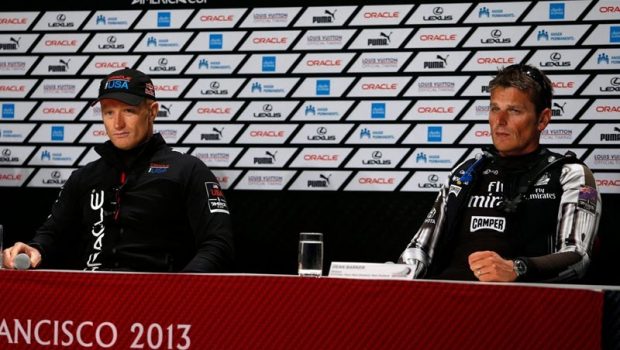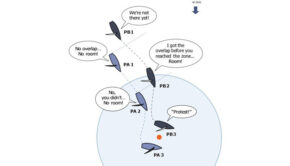Preparing the Mind for Competition
Published on February 1st, 2018
Dr. Tim Herzog utilizes his education in both counseling/sport psychology and in clinical psychology to help athletes with their mental preparation for competition. A racing sailor himself, here he discusses this critical performance variable.
When Jimmy Spithill led Oracle Team USA back from an 8-1 deficit against the Kiwis in the 2013 America’s Cup, he was undeniably regarded as “mentally tough.” At the opening press conference for the 2017 America’s Cup Finals, Emirates Team NZ’s Peter Burling confidently stated, “It’s not the first win that matters, but the last.”
Burling seemed unflappable through the rest of the regatta. Many attributions have been made regarding each skippers’ performances, centering on the quality of their “mental game.”
Mental preparation’s impact on performance is clear at any level, whether we’re talking about America’s Cup sailors or a weekend warrior looking to take home the club’s fleet championship. Some wondered in 2017 if the even-keeled Spithill had met his “mental match” in Burling, and if he had done enough to prepare for this battle.
Like athletes in other sports, many sailors leave no stone unturned with regards to their equipment, their practice of technique, and even their physical conditioning. They seek help to accomplish this from sailmakers, coaches, and strength and conditioning trainers, and yet some stubbornly pursue improvement of their mental game on their own.
Why? Here are eight common obstacles (beliefs) to mental performance coaching…
I don’t know what it is: That’s fair. Do some research on my website and others. Learn how the focus is often on the development of skills, and the focus is largely up to you. Also, the Association for Applied Sport Psychology has a great directory of Certified Mental Performance Consultants.
I can do it on my own: We can do a lot of things on our own. Does that mean it’s optimal for us to do so? What’s wrong with accepting a helping hand?
My coach does that “stuff”: Maybe your coach goes there, and maybe he even has a natural knack for being helpful with that “stuff.” Maybe it even makes sense to occasionally let him assist you in this domain, but think about it like this… Even if your family doctor really knew his stuff, would you want him to be the one to do surgery on your broken bone, or to even be the one providing your daily workout plan? Nope, there are experts who have each studied these things exclusively to become really good at them.
Mental and emotional = Vulnerable: Let’s face it, talking about the emotional stuff like how badly we want to win an event, the difficulties of balancing serious training with family life, or the devastation of a loss, is all vulnerable stuff. It’s not like talking about leech tension, weather patterns, or even body fat composition. At the same time, when we reframe vulnerability as something for the strong (are you courageous enough to do this hard work?), our perspective can shift. In the process, we often clear mental/emotional clutter out of the way to enable performance!
What if people find out?: Firstly, if they found out they might be more afraid of facing you on the race course because of the edge you’re gaining. Secondly, it’s confidential! It’s up to you whether or not you tell people.
Time is limited: Yes, but if it’s important (and it is), you can make the time. You might even find that you’re more efficient with the rest of your time because you feel better and more able to focus; it’s amazing how these skills carry over to other parts of our lives.
It costs money: Everything (that’s worth anything) costs money. Make it work on your budget. I work out with a trainer, in a group, to get expert help while also saving money. And doing some is always better than doing none.
I just don’t want to meet with a “head shrinker”: It’s intimidating to meet with somebody who might look at things more deeply. Relationship fit is everything; Believe it or not, you can probably find someone to work with who is down to earth and maybe even has a sense of humor. As a wise midshipman once said to me during my brief time counseling at the Naval Academy, “People should give this a try for four sessions; it becomes more comfortable. If they still don’t like it, they can try another shrink or decide to quit at that point. It’s worth it to hang in there.”
I’m biased, but I’d say it’s worth the risks. Check out mental performance coaching and you just may find that it’s the little something you need to feel and perform your best on the race course!
Dr. Tim Herzog’s practice, Reaching Ahead Counseling and Mental Performance, is located in Annapolis, Maryland. An avid sailor himself, Tim combines a background of academic rigor (2 Masters and a Doctorate) with racing experience (4th at J70 Mindwinters, 2016) and coaching experience (former Head Coach at Boston College, 5th at Dinghy Nationals + 4 All-American Honors). He enjoys working with sailors on the mental game, and helping athletes to surpass whatever barriers to performance.










 We’ll keep your information safe.
We’ll keep your information safe.